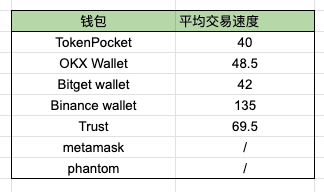In the past two years, the stablecoin market has shown explosive growth, with mainstream stablecoins like USDT, USDC, and USD1 continually expanding to multiple public chain networks, becoming key infrastructure for DeFi, payments, settlements, and even RWA asset circulation.
As users' demand for 'cross-chain transfers' grows stronger, many wallets have launched 'built-in cross-chain transfer' functions that look cool, but the actual experience varies greatly. Some have high fees, some have complex operations, and some simply have no entry point at all.
In this article, we approach from the perspective of an ordinary user, personally testing the cross-chain functions of several mainstream wallets for stablecoins to see which wallet truly excels in terms of 'convenience, safety, and low cost', helping you find the most suitable cross-chain tool.
1. Platform fees
In cross-chain operations, fees are always one of the most concerning factors for users. Although the fees for cross-chain transfers may seem small, the accumulated costs cannot be ignored in frequent operations or large amounts of funds. We have compiled the fee percentages charged by mainstream wallets when executing cross-chain operations as follows:

Observing from the data dimension:
1. The lowest fee rate range is concentrated around 0.30%, made up of TokenPocket, Bitget Wallet, and OKX Wallet (lower limit);
2. OKX Wallet's rate is based on a floating mechanism and may range between 0.3% and 0.4% depending on the service provider; charges are incurred based on different service providers;
3. Binance Wallet is marked at 0.5%, currently in a fee exemption period, and after the free phase, the 0.5% fee is at the industry average level;
4. The fees for Trust Wallet, MetaMask, and Phantom are significantly higher than other wallets, at 0.70%, 0.80%, and 0.85% respectively, which is on the higher end of all samples, resulting in higher cross-chain costs.
2. Comparison of cross-chain speeds
Aside from fees, users are often most concerned about the speed of arrival when using cross-chain functions. If a transfer takes too long to arrive, it can easily cause anxiety and doubt.
After all, cross-chain transfers involve coordinated processing between multiple chains, and different wallets exhibit significant differences in speed performance. We will start from actual testing, selecting the USDT(Tron) — USDT(BSC) path for a simple comparison of cross-chain times across various wallets.

1. TokenPocket has the fastest average transaction speed (40), outperforming mainstream wallets in the market and providing a competitive advantage in actual user experience;
2. Binance Wallet is noticeably slower (135), likely due to its complex cross-chain path and strict confirmation mechanisms;
3. Metamask and Phantom were not tested as they do not support the Tron and BTC chains;
4. Trust and OKX Wallet have moderate performance but are still significantly slower than TokenPocket, with speeds approximately 73% and 21% higher, respectively.
3. Comparison of multi-chain support levels

TokenPocket ranks first with support for 44 chains, covering EVM chains like Ethereum, BSC, Polygon, Arbitrum, as well as non-EVM ecosystems like TRON, Solana, and Cosmos. It is one of the wallets with the most comprehensive multi-chain support, particularly suitable for users engaged in complex cross-chain asset management.
Trust, OKX, and Bitget Wallet all support around 25-26 chains, placing them in the second tier, able to meet the mainstream cross-chain needs of most users.
Binance Wallet supports 20 chains, although the number is slightly lower, its coverage is reasonable and suitable for users relying on the BN ecosystem.
MetaMask and Phantom have weak cross-chain capabilities. Although MetaMask supports some EVM chains, it does not support TRON; Phantom primarily focuses on the Solana, Ease, and Ethereum ecosystems, making it unsuitable for stablecoin cross-chain operations.
4. Comprehensive evaluation
Comprehensive fees, cross-chain speed, and number of supported chains:
TokenPocket is currently the best-performing wallet overall, with reasonable and transparent fees, stable cross-chain speed, and the highest number of supported chains, making it especially suitable for medium to high-frequency cross-chain users and users across multiple ecosystems like EVM/TRON/Solana.
OKX Wallet comes next, with fast cross-chain speed and rich chain support, but the fee structure is relatively complex, and instability is higher during initial use.
Bitget Wallet and Trust Wallet perform well in cross-chain speed, but their fees are relatively high, making them more suitable for users who occasionally cross-chain and have speed requirements.
Binance Wallet currently has very low fees, but this is not a long-term state. Once standard fees are restored in the future, it will not have an advantage; the speed is slightly slow, and the number of supported chains is somewhat limited.
MetaMask and Phantom are not suitable as cross-chain wallets due to many restrictions, high fees, and limited ecosystem support.


